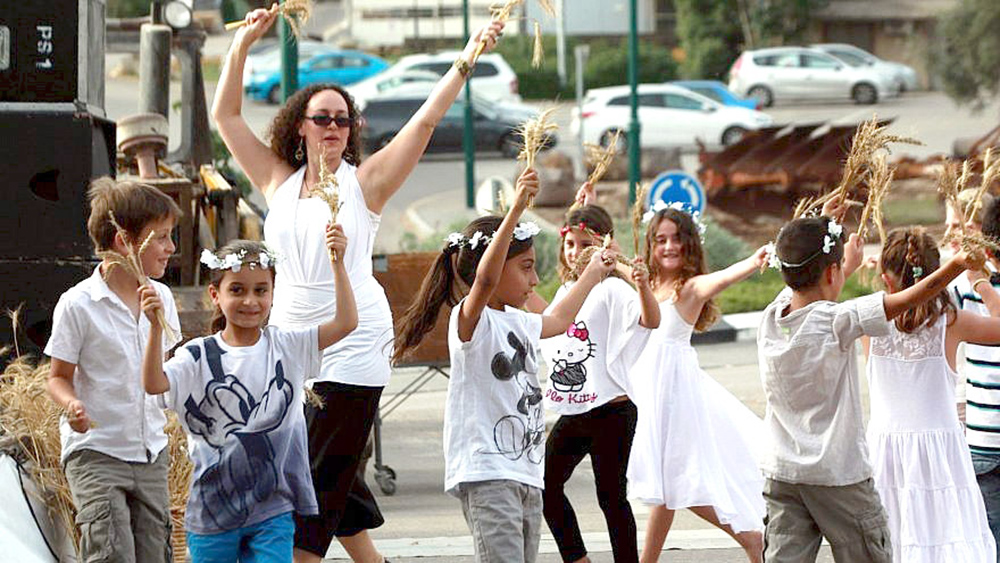“Even if children don’t get all the complexities, just by feeling the specialness of staying up late, and imagining what it must have been like to stand at that mountain and hear the Ten Commandments all together—that and a piece of cheesecake, and altogether they’ll get a sweet taste of what it means, a new family tradition they won’t forget,” says Meredith Lewis, director of content, education and family experience for PJ Library.
It’s one of the most dramatic scenes in the Torah, as amazing as the splitting of the sea.
Imagine the Master of the Universe coming down to Earth in an astounding fireworks display of thunder, lightning and smoke (see Exodus 19 for the exciting details), singling out a ragtag bunch of escaped slaves to receive nothing less than the master plan of the universe: the Torah.
Not to mention the job description as G-d’s agents tasked with serving the boss and making the world a better place.
But whereas most Jews know how the sea split and the Israelites crossed over on dry land from years of reading the Passover Haggadah, far fewer realize that the holiday of Shavuot, 50 days later, marks the equally miraculous giving of the Torah on Mount Sinai.
But to make sure that the next generation doesn’t miss out, Shavuot activities, child-friendly celebrations and books bring to life this 3,300-year-old miracle for you to share with your kids and grandkids.
For Sarah Rabin Spira of Washington, D.C., when Shavuot rolls around (this year, it’s Saturday night, June 8, lasting two days, through Monday, June 10, and one day in Israel), she pulls pillows and blankets into the center of the living room and spreads out a feast of books for a late-night readathon with her 6- and 8- year-olds, often inviting over friends for a pot-luck dinner and plenty of ice-cream as well.
“Several years ago, we hit on the formula of gathering up all their favorite books, especially the Jewish ones—everything they could possibly read in one night—and letting them stay up late,” says Spira, who runs the PJ Library (a program of the Harold Grinspoon Foundation, a North American Jewish nonprofit organization based in West Springfield, Mass.), and family education and engagement for the Jewish Federation of Greater Washington. “As parents, we can get behind any holiday where you are encouraged to stay up late, eat dairy and read books. It makes for a special time.”
‘Laws are a great Jewish innovation’
Shavuot, the “Festival of Weeks”—sometimes called Chag HaKatzir (“Harvest Festival”), Yom Habikurim (“Day of the First Fruits”) or Zeman Matan Torah (“The Time of the Giving of the Torah”)—was originally an agricultural holiday marking the first of the harvest. But it’s long been recognized as the day the Israelites stood at the foot of Sinai and heard the Voice of G-d declaring the Ten Commandments (at least the first two, until we got good and scared and begged Moses to take over for the remining eight).
Today, Jews around the globe celebrate the momentous experience of revelation in the desert by staying up late (or for the stalwart, all night) learning Torah, and indulging in such dairy delights as cheesecake and blintzes.
In Israel, the traditions include harvest-welcoming festivals and feasting on native fruits, as well as parades, dances, skits and girls with wreaths of wildflowers in their hair. And each year, tradition has it that a farmer will officially present a basket of fruit and vegetable samples to the president.
“It’s absolutely my favorite holiday,” says Meredith Lewis, director of content, education and family experience for PJ Library. For one, Shavuot offers parents the chance to explore some deep Jewish concepts with their kids, she says. “What does the idea of bikkurim, first fruits, mean to us in our lives? How does the wisdom and loyalty of Ruth [the book of Ruth is traditionally read on the holiday] speak to us today?”
The holiday also represents transitions, she adds, “from school to summer, from being a little kid to a big kid who can stay up and learn with the grownups and have ideas about what the Ten Commandments mean to them.”
When it comes to Shavuot and Torah in general, “I’m a big fan of interactive Torah,” says Rabbi David Fohrman, founder of Aleph Beta, a program of animated videos around Torah and Jewish holidays that he describes as “Netflix for Torah.”
For Shavuot, the rabbi is hoping that the videos “inspire conversation around the table, which often take a turn you’d never expected.” One of them, “The Hidden Structure of the Ten Commandments,” for instance, challenges the viewer to explore how the first five commandments differ from the last five and what they come to teach us today. (For instance, not coveting might mean to us not being jealous of someone with a nicer house or more prestigious job.)
And Shavuot also gives us an easy entrance “into a discussion of why it’s wonderful to have laws, what our world would be like if there were no laws and how they bring us closer to G-d, and what we’re supposed to do as Jews in this world to serve G-d and not some human master. Turns out these laws are a great Jewish innovation.”
(JNS.org)




